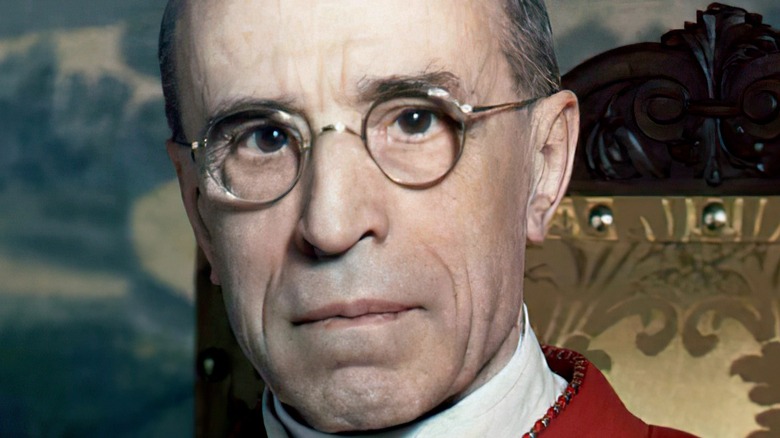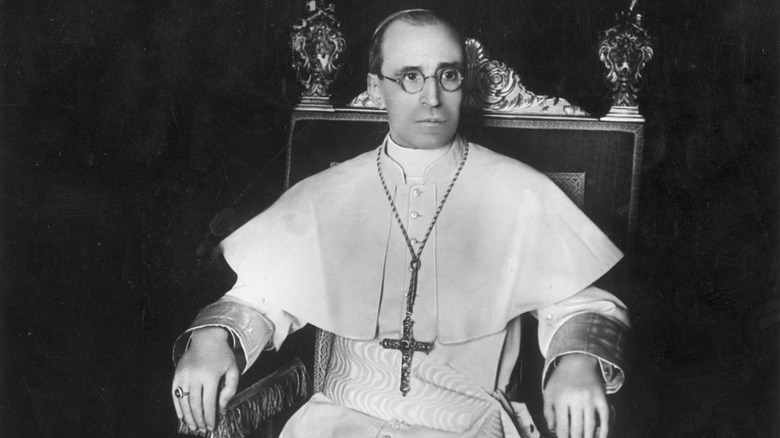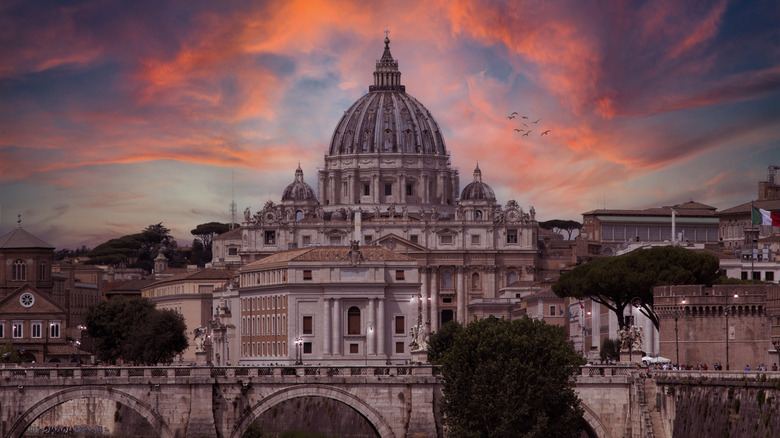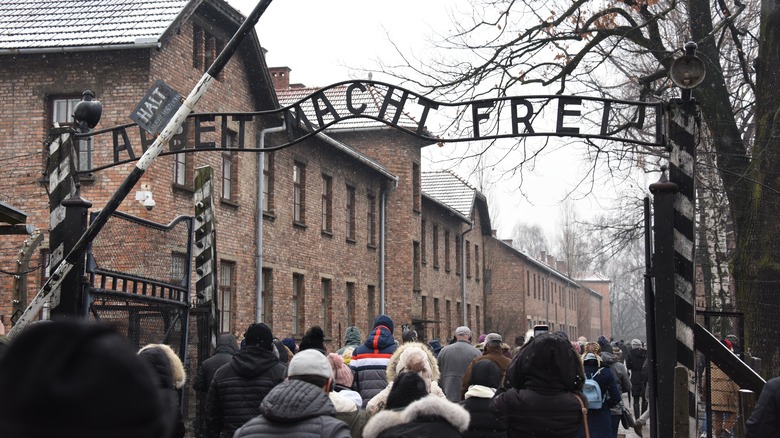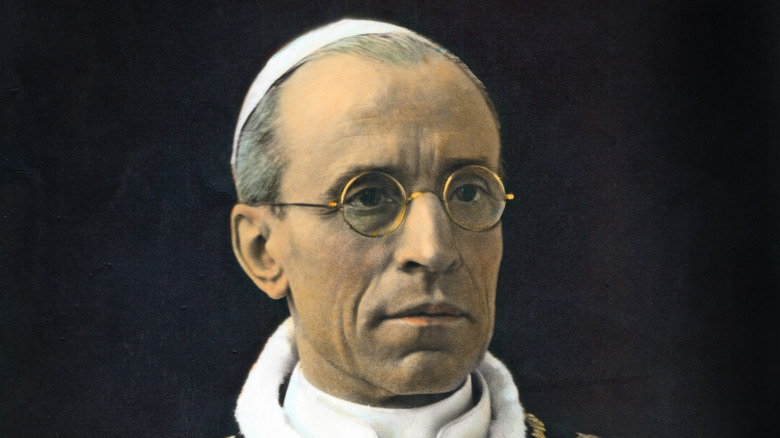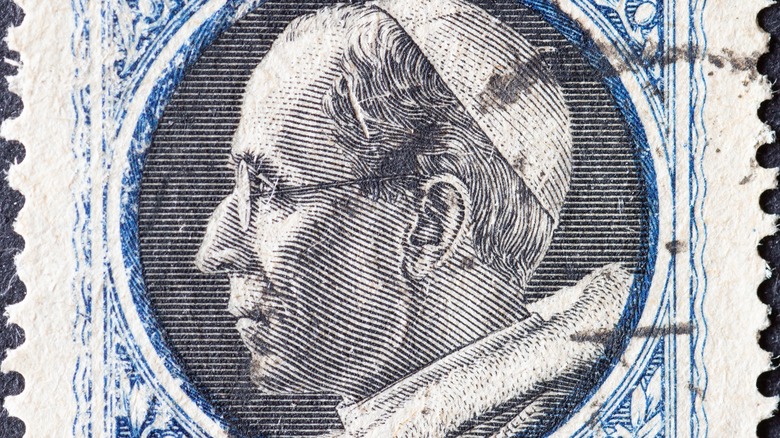Why Pope Pius XII's Inactivity During The Holocaust Remains Controversial To This Day
The role of the pope is, according to Britannica, intended to be a continuation of the job of Jesus' disciple, Peter. In other words, he's been given the job that Peter and hundreds of men after him have had as the Earthly head of the Catholic Church, who wields "full and supreme power" over its affairs. In a larger sense, he's ceremonially recognized as the representative of Jesus Christ to the world.
Despite this, not all of the men who have served as pope over the centuries have been men who led moral or admirable lives. In fact, according to Catholic World Report, there was a period of time in the 10th century when the role was so degraded by immoral men (and the women who held influence over them) that the era has been given the name "Pornocracy," or a government by sex workers. One of the popes during this period, John XII, turned Vatican property into a brothel and appointed mistresses to high-ranking positions.
While that particular era was all water that went under the bridge centuries ago, men who've ascended to the papacy are still men capable of making bad decisions, and acting in unsavory ways, despite the high moral expectations attached to their position. In recent history, one such man was Pope Pius XII, due to his actions (or rather inactions) during World War II and the Holocaust
Before He Was Pope
Before ascending to the papacy and taking the name Pius XII, Eugenio Pacelli was an Italian-born church official who served the church in Germany in various capacities, according to Jewish Virtual Library. Though he'd been living and working in Germany even as Hitler and the Nazis were consolidating their power, Pacelli had little to say directly, about the regime, and what he did say largely consisted of platitudes. In a 1935 speech, he called the Nazis "miserable plagiarists who dress up old errors with new tinsel," and referred to Nazi political ideology as "profoundly anti-Christian and a danger to Catholicism."
Hitler was elected to Germany's highest office in 1933. That same year, Pacelli struck a deal with the regime that would grant freedom of practice to Catholics, but would also compel Catholics and the church itself to stop participating in politics, which in turn led to the dissolution of Catholic political parties in Germany. The pope at the time, Pius XI, was not a fan of Hitler nor the Nazis, and even publicly condemned Nazi persecution of Catholics, making it a point to skip town when Hitler was in Rome.
When Pacelli became the pope in 1939, things became considerably more muddled.
Pius' Response To The Outbreak of World War II
As Pius XII's papacy began, his words and actions would seem to reveal that he was concerned about the expanding Nazi regime only inasmuch as it impacted the Catholic Church. In a meeting with a Nazi official that took place in May 1939, according to Jewish Virtual Library, Pius XII seemed more concerned with the health of the Catholic Church in Germany than with its persecution of anyone else. "I am certain that if peace between Church and state is restored, everyone will be pleased," he said. "The German people are united in their love for the Fatherland. Once we have peace, the Catholics will be loyal, more than anyone else. We love Germany. We are pleased if Germany is great and powerful."
When World War II broke out in 1939 with the German invasion of Poland, Pius XII's response was a platitude that condemned war generally and a call for resistance, but which was largely thin on specifics. "Who among 'the Soldiers of Christ' — ecclesiastic or layman — does not feel himself incited and spurred on to a greater vigilance, to a more determined resistance, by the sight of the ever-increasing host of Christ's enemies," he wrote in the document, archived on the Vatican's website. In later paragraphs, he called on Catholics to pray fervently.
Reports of Concentration Camps
Between the official outbreak of World War II in 1939 and October 1942, the Vatican, of which Pius XII was the literal and ceremonial head, was getting frequent reports from all over Europe about the persecution of Jews. According to Jewish Virtual Library, a Palestinian rabbi pleaded with the Vatican to keep Spanish Jews from being deported to Germany. That plea, and others, fell on deaf ears.
In August 1942, a Ukrainian official pleaded for the Pope's help after tens of thousands of Jews in that country were systematically killed. Pius XII responded with a missive containing scripture quotes and a directive to "bear adversity with serene patience," according to Jewish News.
By the end of 1942, the Vatican was aware of the mass extermination of Jews at the hands of the Nazis, as a report from U.S. bishops made abundantly clear, according to Inside the Vatican. "We feel a deep sense of revulsion against the cruel indignities heaped upon Jews in conquered countries and upon defenseless peoples not of our faith," the document read. Pius XII still refused to act.
The Purported Reasons For Pius XII's Inaction
The list of opportunities Pius XII had to condemn Nazi activities, intervene on behalf of persecuted Jews, or otherwise do anything at all, is at once lengthy and shocking. As Jewish News reports, in addition to the incidents mentioned above, he also only spoke up for Jews who had converted to Catholicism, refused to excommunicate Nazis (including Hitler), and even turned a blind eye to the roundup and deportation of over a thousand Jews in Rome, literally a few hundred yards away from his apartment. In the latter case, the Vatican's only intervention was to make appeals for the lives of a handful who were actually Catholic. Nothing was done for the rest.
As to why, Brown University history professor David Kertzer suggests that there were two key reasons (via NPR News). The first was a commitment, ill-advised or no, to neutrality. "Pope Pius XII thought that he should not take sides in the war, and that therefore he should not be criticizing either side of the war, including the Nazis," Kertzer said.
The second reason was unambiguous anti-Semitism within the Vatican. Pius' expert on Jewish affairs, Monsignor Angelo Dell'Acqua, was openly anti-Semitic. "He said Jews have caused problems ... do threaten a healthy Christian society. So why should the Church be speaking out for them when he says they haven't protested against the Nazis killing Christians?" Kertzer said of Dell'Acqua.
A Strange Coda: Jewish-Catholic Orphans And Kidnapping
It seems that Pius XII's inaction during the Holocaust would continue well after the last of the concentration camps had been liberated and World War II was largely in the rearview mirror. Specifically, the pontiff's resistance to returning Jewish orphans to their families would continue for years, long after the war was over.
As NPR News reports, at least 1,200 French Jewish children were saved from the Holocaust thanks to being baptized Catholic — whether they consented to it or not — and then being placed in the care of Catholic families or in Catholic orphanages. However, when the war was over, the Vatican seemingly dragged its feet in getting the kids back to their families — and here, "dragged its feet" means "steadfastly resisted at all costs."
Two young French Jews in particular became the focal point of this issue: the brothers Robert and Gérald Finaly, who were baptized and then hidden away with a Christian family while their parents were sent off to a concentration camp. By the 1950s, their surviving family members wanted them back, but the Vatican insisted that they were Catholics now and could not be raised by non-Catholics. The issue dragged out in the courts for years, and became an embarrassment to the Church in France, which was effectively accused of having kidnapped the boys (via The Atlantic).
